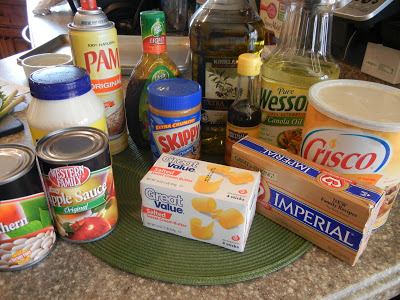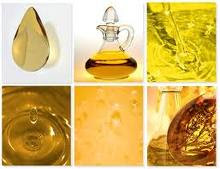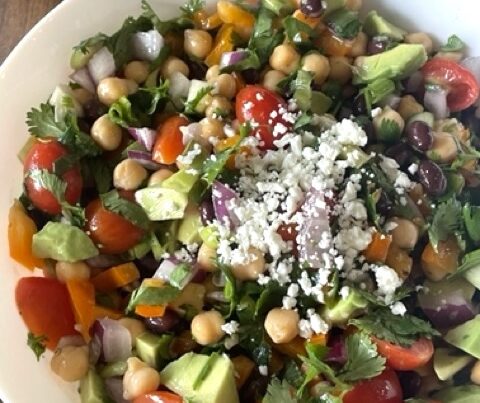
It is a new month and a new year and the perfect time to set those new year’s resolutions to become better prepared and to get your food storage! Becoming self reliant and better prepared is not an overnight task. Don’t become discouraged, just do a little at a time and over the next year you will be amazed at where you began and how much you have accomplished. Our motto at Deals to Meals is ‘Your food storage ONE week at a time!’ Even if all you do is add one can to your storage each week, that will be 52 cans of food at the end of the year you will have. It may not be much, but it will be 52 more cans than you had the previous year. Baby steps is the answer!

I hope this year I can help you become even more motivated and excited about putting your houses in order, getting your food storage and preparing for emergencies. We can do this together and we can make it FUN (I promise!!). So, let’s get started with our goals and area of focus for this month.
PRINTER FRIENDLY OIL/FAT HANDOUT
FOOD STORAGE GOAL: 3 MONTH SUPPLY OF OIL PER PERSON (ABOUT 3 QUARTS PP)
Our food storage goal for this month is for your family to stock up on those oils and fats in your food storage. Oil is one of the next most important items to store (next to water, wheat and
po wd. milk & eggs) in our food storage. Most people think of oil as being something ‘bad’ for their bodies and so they don’t store a lot of it. The truth is that our bodies need a certain amount of fat to stay healthy and energized. Now, how much fat we eat and which fats we eat are something to be careful with. However, if you are eating fats/oils in moderation and using them in your cooking, they are an important part of your food storage and overall health.
wd. milk & eggs) in our food storage. Most people think of oil as being something ‘bad’ for their bodies and so they don’t store a lot of it. The truth is that our bodies need a certain amount of fat to stay healthy and energized. Now, how much fat we eat and which fats we eat are something to be careful with. However, if you are eating fats/oils in moderation and using them in your cooking, they are an important part of your food storage and overall health.
One of the most important reasons for storing oils in your food storage is it ads flavor and texture to your food. Oil makes many baked goods and breads more moist, smooth and pliable. Fats like olive oil and butter also add flavor to the food we eat. Without fats in our diet our food would be bland, dry and overall tasteless. I have done a lot of research on the earlier pioneers who came to our nation and many of them survived solely on flour (made from wheat), salt (if they were lucky), water and oil. They would make a paste or sticky dough from the flour, water and salt and fry it in a pan of oil. Without the oil they would be eating a pasty undesirable substance. When this dough was fried, they would have something that would resemble fried bread or scones, and would be much more desirable. Oil was an important item for our earlier ancestors as well as a investment to those who lived during World War II. Families were able to buy land with oil during WWII and it became almost as valuable as gold was. The reason being, it made food edible!
I am not saying we will be able to buy land with our oil any time soon (if ever!), but I hope to help you understand the importance of storing an adequate supply in your food storage. Now, is the only oil you should store vegetable oil? No! There are several different types of oil, all with different nutritional benefits. Store those oils/fats you are already used to using in your everyday cooking. Below are the YEAR supply totals per person, and shelf life of each type of oil (approximately–adjust where needed):

*Olive Oil (1 jar per person): 1 1/2-2 years (can keep in the fridge to last longer)
*Canola, Vegetable, Coconut, or Peanut Oil (2-3 jars per person): 1 year (can keep in the fridge to last longer)
*Shortening (1/2-1 tub per person): 1 year
*Mayonnaise (2-3 jars per person): 2 years
*Peanut Butter (4 jars per person): 2 years
*Salad dressings (3 jars per person): 2 years
*Sesame oil (if you do a lot of oriental cooking like I do, store a few extra bottles 😉
*Butter (5-10 lbs. per person): 1 year in the freezer
*Margarine (5-10 lbs. per person): 1 year in the freezer
Many people use the excuse of not storing oil because they are afraid it will go rancid. Although this is a valid concern, if you are buying oils/fats you use on a regular basis, you shouldn’t have the problem of having the oils go ‘bad’ before you use them. If you do, I think of oil storage as being kind of like a life insurance policy. If I don’t have to use it, great, but if I do, I will sure be glad I had it! If you have to throw out a couple of $2 containers of oil over the next few years, this shouldn’t be the end of the world. Store what you use and eat what you store and you should be just fine 🙂
Below are 10 tips to help make storing your oils easier and less problematic:
Storing oils and fats long term can be problematic. These problems occur when the oil and fats become rancid. This process is called oxidation. Eating rancid foods is unhealthy and should be avoided where possible. Although fats and oils can turn rancid somewhat quickly, there are a few tips to help your storage of oils/fats successfully:
1-Heat, air and light are the enemies of oil! Keeping oil away from these three factors will help your oils/fats last longer.
2-Store opened (and unopened) oil containers in the fridge (if at all possible). This will help your oils last MUCH longer. If your oils when stored in the fridge turn cloudy, they are still fine for cooking. If left at room temperature, the cloudiness will go away.
3-If possible, buy your oils in opaque, airtight containers.
4-Store oils in a cool place that is less than 50 degrees, instead of in a warm pantry. If stored in your kitchen, try to keep away from stoves, microwaves or other heat sources.
5-Store oils in the dark (place in a box or cabinet with a lid).
6-Buy oils in smaller containers. This way you won’t be exposing a large quantity of oil to the air after opening. This will help them not go rancid so quickly.
7-Think of your oil storage as an insurance policy. You may have to discard a portion of your stored oils and fats after 1 to 2 years, but you will be glad you had it if you needed to live long term out of your storage.
8-When purchasing oils at the store, choose the ones from the back of the shelf that have been kept further away from direct light.
9-Some oils and fats like margarine, butter and olive oil, can be frozen for later. When ready to use, just bring back to room temperature and then stir thoroughly before use. If you are storing liquid oils, you will need to pour a small portion of the oil out before freezing to allow for expansion. Butter and margarine store perfectly in the freezer for up to one year. When these items go on sale (usually during the holidays), stock your freezers full to save money!
10-Rotate your oils at least yearly. Date the containers of oils in your storage with their estimated expiration date so you know to use the older oils before the newer ones. Keep updated on your oil and fat storage every 6-12 months.
Throughout this month I will be giving you recipes and ways you can use the oil in your storage, so check back on our blog regularly (or just become a follower). Some recipes that may tempt your pallet this month will include: homemade pizza dough, moist cakes, homemade pie crust, homemade salad dressings, fry bread, scones, and MUCH more!!
Positively Preparing Goal Review: If you need a review, recipes, or a printable handout for any of the below month’s themes, follow the link and they will take you to that month’s food storage and emergency preparedness information.
December: 3 month supply of sugar per person
November: 3 month supply of powdered eggs & milk per person
October: 3 month supply of wheat per person
September: 2 week supply of water per person
January Emergency Preparedness Goal: Emergency cooking & fuel storage. More to come in the next couple of days 🙂










